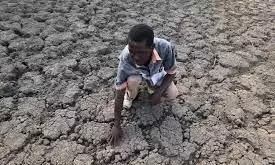
Zimbabwe grapples with hunger amid El Nino-induced drought
text_fieldsThe El Nino weather pattern is causing severe drought and famine-like issues in Zimbabwe.
In the Zimbabwean village of Buhera, residents are gathering at a primary school, awaiting their turn to receive essential food supplies including grain, peas, and cooking oil. For many, like 71-year-old Mushaikwa, the handouts provide a lifeline, although they recognize it may only last for a month. Mushaikwa told Reuters, "We are grateful, but the food will only be enough for one month. My crops are wilted."
Zimbabwe has been grappling with food insecurity since 2000, following the seizure of white-owned farms by former president Robert Mugabe, which disrupted agricultural production and led to significant declines in output. As a result, a large portion of the population has become dependent on food aid for survival.
The situation has been compounded by an El Nino-induced drought affecting many southern African nations. The Zimbabwean government estimates that 2.7 million people will face hunger this year, although the actual number could be higher. Officials are considering declaring a state of emergency to address the crisis.
El Nino, a natural weather phenomenon characterized by disrupted wind patterns and warmer ocean surface temperatures in the eastern and central Pacific, occurs every two to seven years. It often results in extreme weather events such as prolonged droughts, tropical cyclones, and wildfires.
Christine Mendes, the acting country director of the World Food Programme, observed the dire situation in Buhera, where many crops have withered due to the drought. Zimbabwe's staple maize harvest is anticipated to decrease by half to 1.1 million tons this year.
The World Food Programme has provided assistance to 270,000 people in four drought-prone districts between January and March. However, additional funding is needed to extend aid to more affected individuals.
























